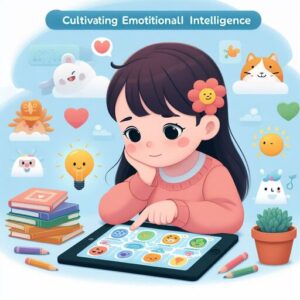In today’s rapidly changing world, emotional intelligence is recognized as a crucial skill for children’s success and well-being. Social-emotional learning (SEL) apps for kids’ tablets have emerged as effective tools for cultivating emotional intelligence, empathy, and social skills in young learners. These apps provide engaging activities, interactive stories, and guided exercises that help children understand and manage their emotions, build positive relationships, and develop resilience. In this article, we explore the importance of emotional intelligence in children’s development and delve into the world of social-emotional learning apps for kids’ tablets.

Understanding Emotional Intelligence
Emotional intelligence refers to the ability to recognize, understand, and manage one’s own emotions, as well as to empathize with the emotions of others. Children with high emotional intelligence are better equipped to navigate social interactions, cope with stress, and build healthy relationships. Cultivating emotional intelligence in children lays the foundation for academic success, mental health, and overall well-being.
The Importance of Social-Emotional Learning
Social-emotional learning (SEL) is the process through which children acquire the knowledge, skills, and attitudes necessary to understand and manage their emotions, set and achieve positive goals, show empathy for others, establish and maintain positive relationships, and make responsible decisions. SEL fosters a supportive learning environment, enhances academic performance, reduces behavioral problems, and promotes mental health and resilience.
See price for All-new Fire HD 8 Kids Tablet Bundle. Includes Fire HD 8 Kids Tablet |Disney Princess & Made For Amazon PlayTime Volume Limiting Bluetooth Kids Headphones Age (3-7)|Purple https://amzn.to/49btwcJ
Benefits of Social-Emotional Learning Apps
Social-emotional learning apps for kids’ tablets offer numerous benefits for children’s emotional development and well-being, including:
-
- Emotion Recognition: SEL apps help children identify and label their emotions accurately through interactive activities, animated characters, and storytelling. Children learn to recognize facial expressions, body language, and verbal cues associated with different emotions.
- Emotion Regulation: SEL apps teach children strategies for managing and regulating their emotions in healthy ways. Through guided exercises, breathing techniques, and mindfulness practices, children learn to cope with stress, anxiety, and frustration effectively.
- Empathy and Perspective-Taking: SEL apps promote empathy and perspective-taking by encouraging children to consider the thoughts, feelings, and experiences of others. Interactive stories, role-playing scenarios, and virtual simulations help children understand diverse perspectives and develop compassion for others.
- Social Skills: SEL apps teach children essential social skills, such as communication, cooperation, conflict resolution, and assertiveness. Through interactive games, collaborative activities, and peer interactions, children learn to build positive relationships and work effectively in groups.
- Problem-Solving and Decision-Making: SEL apps equip children with problem-solving and decision-making skills necessary for navigating social situations and resolving conflicts. Children learn to identify problems, generate alternative solutions, evaluate consequences, and make responsible choices.
- Resilience and Coping Skills: SEL apps foster resilience and coping skills by teaching children to bounce back from setbacks, adversity, and challenges. Through guided reflection, goal-setting exercises, and positive affirmations, children develop a growth mindset and a sense of self-efficacy.
Features of Social-Emotional Learning Apps
Social-emotional learning apps for kids’ tablets offer a range of features designed to engage children and support their emotional development, including:
-
- Interactive Stories: SEL apps feature interactive stories and narratives that address social-emotional themes, such as empathy, kindness, friendship, and diversity. Children engage with characters, make choices, and explore the consequences of their actions.
- Guided Activities: SEL apps provide guided activities and exercises that help children practice emotion recognition, regulation, and social skills in a supportive environment. Children receive feedback, encouragement, and reinforcement as they progress through the activities.
- Character Development: SEL apps focus on character development and moral values, emphasizing traits such as honesty, integrity, respect, and responsibility. Children learn ethical principles and moral reasoning through storytelling and role-playing.
- Self-Assessment: SEL apps offer self-assessment tools that allow children to reflect on their emotions, behaviors, and social interactions. Children can track their progress, set personal goals, and monitor their growth in emotional intelligence over time.
- Parental Involvement: SEL apps provide resources and materials for parents, caregivers, and educators to support children’s social-emotional learning at home and in school. Parents can access tips, strategies, and conversation starters for discussing emotions and social skills with their children.
See price for Fire HD 10 Kids Tablet (32GB, Disney Mickey Mouse) + Kids Headset https://amzn.to/4asMT1Q
Popular Social-Emotional Learning Apps for Kids’ Tablets
Several social-emotional learning apps cater specifically to children and offer age-appropriate content, engaging activities, and interactive features. Some popular social-emotional learning apps for kids’ tablets include:
-
- MoodMeter: MoodMeter is an emotion-tracking app that helps children identify, understand, and regulate their emotions. Children select their current mood on a colorful grid and receive suggestions for coping strategies based on their emotional state.
- Second Step: Second Step offers a comprehensive SEL curriculum for children, featuring interactive lessons, videos, and activities on topics such as empathy, problem-solving, and emotion management. The app includes resources for educators and families to support SEL implementation.
- Mind Yeti: Mind Yeti is a mindfulness app designed for children to practice relaxation, focus, and self-awareness. Children listen to guided mindfulness sessions led by animated characters, learning breathing techniques and mindfulness exercises.
- Peppy Pals: Peppy Pals is an award-winning app that offers interactive stories and games designed to teach children social and emotional skills. Through engaging narratives and relatable characters, children learn about empathy, friendship, and cooperation while having fun.
- Mightier: Mightier is a biofeedback-based gaming program that helps children regulate their emotions and manage stress. Children play specially designed video games that respond to changes in heart rate, teaching them coping skills and emotional regulation techniques.
- Super Stretch Yoga: Super Stretch Yoga introduces children to the practice of yoga through fun and interactive activities. Children learn mindfulness, relaxation techniques, and body awareness while following along with animated yoga poses and breathing exercises.
Tips for Parents and Educators
Maximizing the effectiveness of social-emotional learning apps requires support and guidance from parents and educators. Here are some tips for incorporating these apps into children’s daily routines:
-
- Be Involved: Take an active interest in your child’s social-emotional development by exploring SEL apps together, discussing emotions, and practicing skills learned in the apps during everyday activities.
- Model Healthy Behaviors: Demonstrate positive communication, empathy, and problem-solving skills in your interactions with others. Children learn by example, so modeling healthy behaviors sets a powerful example for them to follow.
- Encourage Open Communication: Create a safe and supportive environment where children feel comfortable expressing their emotions, asking questions, and seeking help when needed. Encourage open communication and validate children’s feelings and experiences.
- Provide Feedback: Offer constructive feedback and praise for children’s efforts and progress in using SEL apps. Acknowledge their achievements and celebrate their successes, no matter how small.
- Reinforce Learning: Reinforce the lessons learned from SEL apps in real-life situations by discussing emotions, problem-solving strategies, and social skills during everyday interactions. Help children apply what they’ve learned to navigate challenges and build positive relationships.
- Collaborate with Educators: Collaborate with teachers and school staff to integrate SEL apps into the classroom curriculum and reinforce social-emotional learning across different settings. Share insights, resources, and strategies for supporting children’s emotional development.
See price for DOOGEE T10 Android Tablet 2K HD 10.1 inch, 8+7GB RAM 128GB ROM(TF 1TB), Octa-Core Android 12 OS, Battery 8300mAh, 2.4/5G WiFi&Bluetooth 5.0, 13MP+8MP Camera, TÜV Low Bluelight Tablet for Kids (Blue) https://amzn.to/3vzxhLb
In Conclusion
Social-emotional learning apps for kids’ tablets play a vital role in cultivating emotional intelligence, empathy, and social skills in children. By providing engaging activities, interactive stories, and guided exercises, these apps help children understand and manage their emotions, build positive relationships, and develop resilience. Parents and educators can leverage social-emotional learning apps to support children’s emotional well-being and foster a positive learning environment at home and in school. As technology continues to evolve, social-emotional learning apps will remain valuable tools for promoting children’s social-emotional development and preparing them for success in school and in life.

